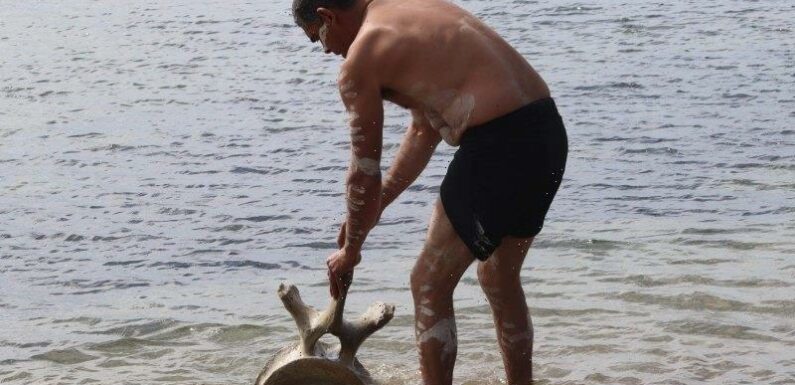
The people of the coast came to the shore to sing the creatures of the deep back to the waters of Portland Bay, in south-west Victoria.
Hundreds of voices joined in a wordless hum. Rain came and went and the sun poked through the clouds and the hum went on.
“Welcome,” cried the master of ceremonies, a sort of choirmaster. “Welcome to the phytoplankton.”
Gunditjmara man Shea Rotumah washes a whale bone, declaring “the water remembers the whale, and every fibre of the bone’s marrow remembers the sea – they’re connected”.Credit:Rebecca Tobin
The spooky hum rose and fell.
Yes, and welcome to the clouds of tiny zooplankton and krill, which feed on the phytoplankton.
And the fish, the dolphins, orcas, lobsters and squid. Right up to the largest creature ever to inhabit the Earth, the blue whale, which feeds on the krill.
And the seals, which feed on the fish.
And the sharks, which feed on everything.
And welcome to the seabirds and all the rest.
Huh-oommmm, droned the crowd, over and over, accompanied by a trumpet held on a single drawn-out note.
It was as close to an animist ceremony as you might imagine, though most of the townspeople and those who had come in from farms and settlements around the bay mightn’t readily identify with the belief that objects, places and creatures all possess a distinct spiritual being.
Yet there it was: animism comes from the Latin “anima”, meaning variously “breathing, air, spirit and life”.
The Aboriginal dancers who preceded this call to the sea needed no explanations. Their people, the Gunditjmara, have breathed the spirit and the life of the coast and its hinterland for longer than imagination.
The Koondoom Yarkeen Karweeyn dance group, representing the Gunditjmara Nation, at Portland’s Upwelling Festival.Credit:Rebecca Tobin
Their dance ground on the beach, called Karweeyn Mirring, was fashioned in the shape of a whale, and they placed whale bones around. A fire was built to produce purifying smoke.
Gunditjmara clans had feasted since forever on whales beached around these parts. The songlines performed by the dancers spoke of reverence for all living things on this coastline, and sorrow at the numerous species that had gone to extinction.
They paid homage, too, to the old Portland clan, the Ure, long disappeared. Only eight of the original 59 clans of the Gunditjmara survive today.
When European whalers came in the early 1800s, one of the clans, the Cart Gunditj, who lived on a hill overlooking the bay, raised smoke to signal to the white hunters when whales came into sight, trusting they’d get a share of the catch.
But when a harpooned whale blew ashore in a storm and the people of a neighbouring clan, the Kilcarer Gunditj, insisted on their right to it, the whalers got their guns and “convinced” the clan it was not theirs.
And so occurred, at what is still called the Convincing Ground, the first known massacre of Aboriginal people by whites in what became the state of Victoria.
Yet two centuries later, here in Portland, Victoria’s oldest town, were Gunditjmara dancers from both the east and the west of their nation and hundreds of people with no Indigenous heritage joined in a reverential call from the beach to the krill and whales and other sea creatures.
Nearby, at the town’s wharf reserved for fishing trawlers, a pastor performed another ancient and spiritual ritual, brought from the Mediterranean and the British Isles.
The pastor blessed the fishing fleet, prayed for the safety of all who go to sea, and tossed a cross into the water. Hardy swimmers leaped in, competing to retrieve the cross.
This was last weekend’s Portland Upwelling Festival. It seems an apt name for a festival that achieved such an upwelling of the spirit of a people with a conflicted past that it drew hundreds to stand together, united in a form of song on a beach.
The Upwelling, however, refers to something vastly older than any human ritual.
The Australian continent finally separated from Antarctica and set off north at a few centimetres a year about 30 million years ago.
Yet around November every year, a whisper of the Antarctic returns when south-easterly winds cause the relatively warm surface waters of the Portland coast to veer out to sea.
Chilled water from the Antarctic rushes from the depths to compensate, funnelled to the surface through canyons on the lip of the continental shelf, where the continents tore apart all that time ago.
The shelf stretches to its slope only about 20 kilometres from the coast of Portland and west beyond Robe in neighbouring South Australia. It is the narrowest strip of the shelf along the Australian coastline.
The frigid water brings a riot of new life, starting with the krill right up the food chain to the great whales and the sharks. This is the Upwelling.
Call it, if you’re given to romance, a sort of ancient yearning for reattachment between continents long estranged.
The Gunditjmara have known of this magic for thousands of years. The fishing folk who came originally from Cornwall to Portland the century before last, requiring their religious leaders to bless them before they ventured onto the water, learned it, too.
But the joining of the old and new communities into a single voice of hundreds, humming insistently for the return of the Upwelling and all it brings, is new.
In a world of confusion and anxiety, there seemed hope in it. And, we might trust, a getting of wisdom, too.
Most Viewed in National
From our partners
Source: Read Full Article

